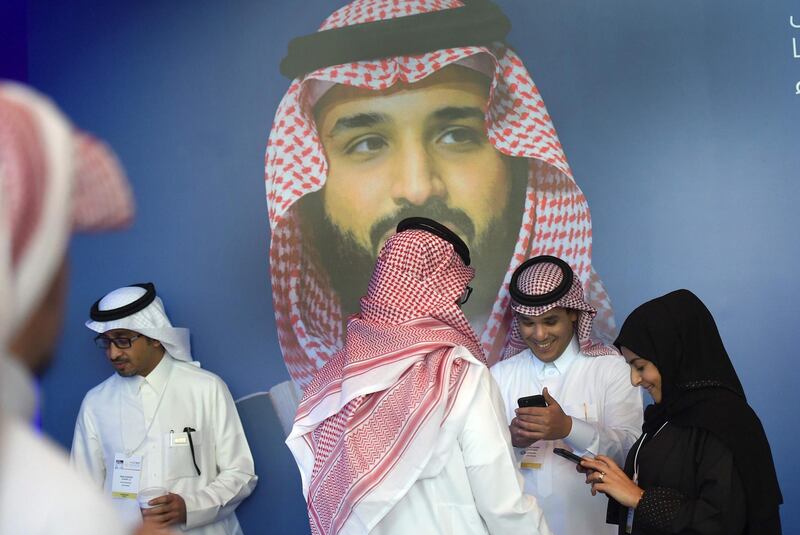“But if we are going to depend on predictable patterns of human behaviour for machine learning, are we not eliminating the possibilities that emerge from random variables?”
That was the question asked by a Saudi teenager sitting comfortably but attentively on a beanbag in an engaging “deep dive” session with a Spanish data scientist at the Misk Global Forum earlier this month.
The workshop on deep learning and its impact on our lives was one of numerous sessions held in Riyadh that builds on the vision of Saudi Crown Prince Mohammed bin Salman in setting up Misk, a foundation that states its mission as “developing the human mind”.
While that sounds like quite an ambitious goal, that is the challenge that has been put to the dynamic team at Misk, short for the Prince Mohammed bin Salman bin Abdulaziz Philanthropic Foundation, which is led by its secretary-general, Badr Al Asaker, one of the Crown Prince’s close advisers.
The aim is to enable Saudi youth and give them a sense of agency and responsibility.
Before writing about the significance of initiatives like that of Misk and the promise of renewed confidence among Saudi Arabia’s youth, who make up 70 per cent of the population of the strongest Arab economy, it is important to highlight that this brief article is not intended to be a complete review of all that is happening or has happened in Saudi Arabia, nor is it a judgement on its foreign policy.
This is an attempt to portray some of what has been unfolding in Saudi Arabia for over a year now and explain why there is a build-up of momentum among young Saudis.
Much of it is linked to the crown prince, who, since assuming his position last June, has amplified the voice of young people in his country.
Much of the engagement with Saudi youth focuses on empowerment through education, culture and media. From supporting an art institute to securing scholarships for the highest achievers in universities like Harvard and Stanford and liaising with a journalism programme with Bloomberg, Misk is a Saudi institution promising its youth the best opportunities possible ... without personal favours.
One point that has appealed to many in Saudi Arabia is that the crown prince is from the heart of the establishment, and yet is turning it on its head.
From getting past what seemed like an insurmountable hurdle of allowing women to drive, to encouraging an open debate on how the country’s economy should progress, he has unleashed an energy and dynamism among Saudi youth that cannot be underestimated.
The anti-corruption drive is one further initiative that has has overwhelming support.
As someone who spent part of her childhood and teenage years in Saudi Arabia in the 1990s and has visited the country regularly, the changes being witnessed are unlike any seen before. The energy can be contagious when listening to young Saudis.
At King Khalid international airport, a Saudi medical student greeted me. Despite continuing his studies at university and hospital, he had volunteered at Misk during the convening of the global forum. Community service has been incorporated into the foundation’s ethos. Landing at midnight, I found an energised young Saudi man eager to talk about the fast-paced changes in his country, saying to me: “This is a new dawn.”
The following morning, as I came to sit down during the main plenary, I asked the usual question about where the women’s section was when a smiling young Saudi female usher responded: “There is no longer a women’s section.”
Young Saudis who had been studying or working abroad are coming back to their home country. One young Saudi had returned home after working on a research project at Harvard to pursue a project on urban development. Another was looking into working on “healthy living” after years of studying abroad.
A Saudi executive who was at first sceptical of the pace of change adopted by the crown prince – and is now an ardent supporter – told me that change was a case of “damned if you do and damned if you don’t”. He expressed a sense of frustration with the amount of criticism levelled at the anti-corruption drive from outsiders. While the questioning of those being detained at the Ritz Carlton and Courtyard Marriott continues, others spoke about the possibilities of new projects that would no longer be confined to the few all-powerful entities with a strong hold on the economy.
Speaking on condition of anonymity, another Saudi entrepreneur said: “We are aware of the risks but there is no option but change.”
Bringing together 4,700 participants, the Misk Global Forum was aptly entitled “meeting the challenge of change”. After all, both change and challenges abound in Saudi Arabia. There was a cautious sense of optimism, one tinged with the fear of the unknown, especially given regional rivalries and the war in Yemen and its costly humanitarian toll. And yet, there was also a determination to usher in a new era that is more proactive than reactive. As France’s foreign minister, Jean-Yves le Drian, said as he addressed the forum: "The winning card in the hand of the Kingdom of Saudi Arabia is its youth", adding that we should "meet this new reality with openness".





